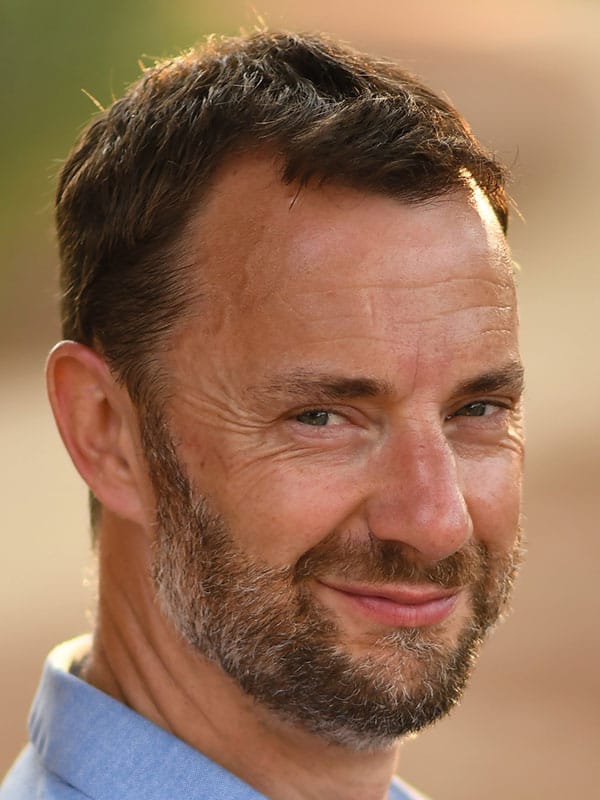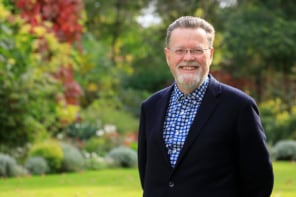Paul Bate is director of NHS services at Babylon Health. He has worked closely with UK prime ministers and secretaries of state, having advised Conservative, Labour and Liberal Democrats on health policy. He has been on the board of the Care Quality Commission, built his own business and worked in management consulting

What sparked your initial interest in physics?
My mum left a Doctor Who book on my bed when I was about six, and casually mentioned that it was probably a bit too old for me. She’d worked out my psychology – I read it just to prove I could. I was hooked on the characters, but most of all on the possibilities that travelling in space and time brought. At the same time, I was busy idolizing my older brother and sister, who were both pretty good at school, particularly my brother who focused on maths and science, so I copied what they did.
It wasn’t until I got to A levels (age 16–18) that the power of physics really kicked in for me. I had a chaotic but inspirational teacher. I had to do a lot of reading of my own to cover the syllabus, but the passion with which he described his PhD was something else. I went to the University of Manchester to study physics and ended up staying there to do a PhD in particle physics.
Did you ever consider a permanent academic career after completing your PhD?
Only very briefly. I’d figured out by then that while I was decent enough when it came to learning, I didn’t particularly enjoy the day-to-day coding and detector maintenance that was part of being a researcher in particle physics. I preferred learning and applying the concepts that others had discovered, rather than doing the primary research itself.
How did your interest in healthcare policy develop?
I went into management consulting with McKinsey & Co after my PhD, and after three years there I took a secondment to the Prime Minister’s Delivery Unit in the Cabinet Office. They gave me the title of “senior problem solver”, which sounded very grand. It was 2003 and Tony Blair was trying to reform health and justice in the same way that he’d done in education during his first term. After a spell looking at prolific offending, I was asked to look at waiting times in the NHS and that was it. I was fascinated by how healthcare – one of the most basic needs in society – was being delivered and how that could be improved. The excitement of presenting ideas to the prime minister and his team was intoxicating.
After three years in the Cabinet Office, I joined a couple of friends from McKinsey to set up and run our own consultancy – 2020 Delivery – focusing on solving problems for NHS organizations and government. I kept the links with people in central government, though, and when four years later I heard that a role was going at 10 Downing Street, I put my application straight in. I landed the government health adviser job, working jointly for David Cameron and Nick Clegg.
What was it like working at 10 Downing Street?
It’s hard to describe the feeling of going through that iconic black door each morning. There’s a strong sense of history, of responsibility and, most of all, of the need to deliver fast. 24-hour news cycles and five-year parliaments force the discipline of providing advice quickly and accurately. I worked as hard as I’ve ever done, and rarely switched off, even at weekends. I don’t think I’d have done the job if I’d known how tough it would be, but it was one of the most exciting times in my professional life and I enjoyed (almost) every minute of it.
What was the main motivation for you, when it came to this demanding role?
There’s always a buzz in being part of a team, and all the more so when the results of the team are very much in the public eye. And every so often it’s possible to do something that really improves people’s lives – like doubling the research money for tackling dementia, or ensuring that all hospitals and GPs can easily get feedback on how they are doing from their patients. I used to be fairly cynical about politicians, but my time working with them changed that – almost without exception, they want to make the world a better place and put in long hours to do so.
How did you become interested in improving healthcare services using AI technologies?
I joined the Care Quality Commission after leaving Number 10, helping design how hospitals, care homes and GPs should be regulated, and how their quality can be compared. GP practices fascinate me – there’s very little outcome data, and what is discussed between a patient and their GP is intensely private. How could we understand which practices were performing well, and why was it that so many surgeries had such long waiting times? I wanted to find better and more transparent ways to deliver primary care, and I moved to Babylon Health because it brings together machine learning, remote consultations and clinicians, to change the way people can see a doctor or get advice.
What does your current role as director of NHS services at Babylon Health involve?
I look after the NHS side of Babylon – my team and I are a bit like a snow plough for the rest of the company, in that we’re there to create a clear path for our technology and clinical services teams to deliver. We’re trying to give people choice about how they access healthcare.
What are some of the projects you are working on at the moment?
Just over a year ago we launched the UK’s only digital-first NHS GP practice. More than 35,000 people in London have already switched their NHS practice to “Babylon GP at hand”, as it’s called. They get appointments with NHS GPs, usually within two hours, 24/7 – all free like any other NHS practice. The difference is that in-person consultations are the exception, not the rule. People can check their symptoms and build their “digital twin” using our AI, with GP appointments on the smartphone. There are Babylon clinics around London, but more than 85% of the time, a smartphone appointment is all that’s needed.
How has your physics background been helpful in your work, if at all?
It’s hugely helpful, but in slightly less obvious ways than applying field theory or doing redshift calculations. It’s given me the confidence to break down problems into a structure and work through the analyses needed to find solutions. I’ve done a lot of quantitative work in my career, and the ability to manipulate numbers and apply them to real-world issues is a big positive.
More subtly, I’ve found that people change the way they discuss things with me once they know I was a particle physicist. The scientists I work with are willing to explain their work in more detail, and the medics tend to respect the work that goes into a quantitative PhD. It’s a sort of badge that says “go on, try me – I might understand”.
Any advice for today’s students?
I’ve got plenty of health-policy advice, but that may not be so interesting. Maya Angelou once said that people will forget what you said, people will forget what you did, but people will never forget how you made them feel. I’ve loved that from the moment I heard it – physics is a hardcore, conceptually tough subject, but it’s still a very human endeavour. And humans need to feel good to do their best.
One other thing – it’s best not to wear luminous trousers or sport a mullet haircut. I’m generally happy with where I’ve got to, but the less said about my student fashion-sense the better.


